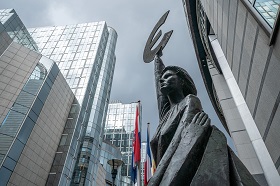International reputation is a delicate, but an intangible asset in alliance relations. In some respects the current scandal is the continuation of the events which took place in 2013-2014. Danmarks Radio, based on anonymous sources, reports that the internal investigation under the codename “Operation Dunhammer” concluded in May 2015 revealed that the NSA had used the access to the Danish submarine communication cables to spy on top politicians in Sweden, Norway, France and Germany, including Angela Merkel, F.-W. Steinmeier and Peer Steinbrück. The Danish FE was aware of this at least since 2015 due to the internal investigation, but neither took steps to prevent this, nor informed the allies. Norway, Sweden and Germany express staunch criticism of the event and demand to be fully informed of the ongoing investigation. Either way allies seem to downplay the controversies and not to voice accusations against each other. Even when it came to the industrial espionage of Sweden’s defence capabilities, the development of a new Gripen airfighters generation in particular, the Saab representatives first described the case as insignificant and then designated it as a disinformation attempt from foreign power. The FE has so far not provided any comments on the matter and the real level of surveillance on foreign politicians and other probable targets remains uncertain. Denmark’s own defence firm Terma might have been the target of industrial espionage conducted with the help of the infamous programme XKeyscore.
It is also difficult to point out tangible political costs associated with that irresponsible behavior on the part of Denmark within the alliance except that Trine Bramsen had to step down February 4, 2022 as the defence minister. Despite Trine Bramsen being exposed to criticism for clumsily handling the FE-case, there is no clear connection between the two events. Her stepping down along with other shifts in the government composition were caused by the former transport minister Benny Engelbrecht being issued a vote of no-confidence. More broadly, it is difficult to discern the consequences of the FE-case for Denmark’s relations with Nordic neighbors and key allies. No punitive measures have been announced except the mentioned demands to share data under the investigation.
The participation of Denmark in all the key U.S. and NATO interventions in 1991–2020 did not free the country from reputational risks due to the persistent problems of equipping the Danish armed forces in accordance with the requirements of the North Atlantic Alliance. The recent news about a growing shortage of ammunition and shells in the Danish Army only seems to lend further evidence to the established tradition of the Danes lagging behind in terms of military capabilities. Chief of Defence, General Flemming Lentfer, in an interview with Danish Radio, stressed that given the available stocks of ammunition, the Danish Army was not combat-ready. Therefore, in his opinion, before planning the purchase of new equipment under a new potential multi-year defence agreement, Danish parliamentarians need to provide the existing set of weapons with sufficient ammunition. The ammunition shortage has suddenly become acute not least because in autumn 2021 the Spanish firm Expal, previously a regular supplier of the Danish Army, unexpectedly withdrew from the seven-year contract with the Danish Armed Forces. Earlier in 2020 the same Spanish firm closed down the cartridge factory in Jelling which had been producing ammunition for Danish military personnel since 1676 and had been privatized by Expal in 2008.
The delay in the key five military projects under the 2018–2023 defence agreement, including the full manning of the heavy mechanized 1st brigade in the amount of 4000 people, known as the “fist of the army” (Dan. hærens knytnæve), and especially, the scandal permeating the Military Intelligence Service of Denmark (Dan. Forsvarets Efterretningstjeneste, FE), which allegedly carried out espionage against German, Dutch, French, Swedish and Norwegian colleagues in favor of the U.S. National Security Agency, have not improved Denmark’s standing in the alliance either. But it is the troubles within the FE, namely the so-called FE scandal, which has undoubtedly grabbed most of the public and mass media’s attention. The highlights of this lengthy scandal were the arrest of four former and current surveillance officers of both the Danish Security and Intelligence Service (Dan. Politiets Efterretningstjeneste, PET) and the FE including the former FE-chief Lars Findsen on December 8, 2021 who was later released from custody on February 17, 2022 after successfully appealing his case and the former minister of defence Claus Hjort Frederiksen being officially suspected on December 20, 2021 for breaching the same paragraph as Lars Findsen of the Danish Criminal Code (Dan. Straffeloven), namely the extremely rarely used paragraph 109 known as «treason paragraph» related to revealing confidential data concerning national security or significant national economic interests abroad which has not been used by the courts since 1979. Both cases continue to be investigated behind closed doors and the precise wording of charges apart from the mentioned paragraph 109 is still unknown. Moreover, rather paradoxically, despite being suspected for the de-facto treason on national scale Claus Hjort-Frederiksen continues to participate in the Foreign Policy Committee of the Danish Parliament. Both Lars Findsen and Claus Hjort-Frederiksen demand that the content of charges against them be made known to the public, and in particular Claus Hjort Frederiksen claims that the alleged «state secrets» are in reality newspaper articles, public speeches and so on which are in public domain and could not be considered as breaching «the obligation of professional secrecy» (Dan. tavshedspligt). Claus Hjort Frederiksen has in different interviews mentioned the cooperation between the US and Danish intelligence services which allegedly made spying on foreign officials possible. But in order to prove that Claus Hjort Frederiksen’s actions were criminal, it has to be shown that his words confirmed the previous speculations about the presence of such intelligence cooperation. The development of the scandal was also accompanied by pressure on key Danish media and editors.
What does this scandal really mean for Denmark’s relations with key allies and Denmark’s democracy? Are there any significant implications whatsoever?
Threat to Democracy?
Some accounts of the frictions with and within the FE are clearly emotionally and morally driven. Edward Snowden also recently had the opportunity to speak his mind on the matter during the interview with the Danish newspaper Politiken. According to him, “it is laughable to equate whistleblowing to treason”. He also added that the idea of betraying country to a newspaper or the public sounded nonsensical. The starting point of the crisis within the FE is the historically unprecedented press release of the Danish Oversight Committee (Dan. Tilsynet med Efterretningstjenesterne, TET) in Folketing published August 24, 2020, which was a to large extent based on the information received from anonymous whistleblowers strongly criticized the FE for illegally gathering and exchanging data about Danish citizens at least since 2014 and providing the Oversight Committee with misleading information. As a result, the now former defence minister Trine Bramsen had to dismiss Lars Findsen along with two other officials from their post in the FE. The special research commission was also established December 21, 2020 in connection with the outrageous press release which openly published the conclusion of its work on December 13, 2021. According to the findings of the commission, accusations and criticism put forward earlier by the Oversight Committee proved to be unjustified.
Three of the four intelligence officers arrested on December 8, 2021 were already released the same month, but investigation of Lars Findsen’s case is still in progress. He is suspected for being connected to the three leaks which received extensive media coverage. The key Danish media citing anonymous sources during 2020-2021 brought to the public attention three dramatic cases involving the Danish intelligence services: the cooperation between the FE and the NSA on getting data from Danish underwater cables and, thus, spying on top-politicians and public servants in neighboring countries, the warning from the FE to the Danish government in September 2020 that the ISIS was kidnapping children from refugee camps in Syria (the Danish government did not follow this warning until March 2021) and the fate of the Danish operative Ahmed Samsam who was falsely accused in Spain of being an ISIS-fighter. These three events contributed to the increasing tension within the triangle of intelligence services, mass media and the government. The editors and directors of the leading Danish media such as Berlingske Media, JP/Politikens Hus, Weekendavisen and Radio LOUD have been explicitly warned by the PET and the FE that the paragraph 109 applies not only to the leaked data, but also to the information being published on newspaper pages. Most journalists perceived it as a direct intimidation. At least 8 different journalists in January 2022 have participated in interrogations during the still ongoing investigation.
It is evident that a democratic system poses a serious dilemma for secret services. On the one hand, the presence of anonymous whistleblowers proves essential to uncovering the excesses of intelligence services and the government, but on the other hand their activities undermine the effectiveness and principles of such services. In this context the present investigation is directed precisely against the «abuses» of democracy by whistleblowers rather than against undemocratic actors. Claus Hjort Frederiksen is also of the opinion that the democratic control over intelligence services might have been a bit too rigorous and some details should have been kept away from the public scrutiny, which could damage the credibility of the FE in the eyes of the American colleagues and the special relationship with the USA in general. It should be noted that Denmark is still part of the «Nine Eyes» arrangement and positioned at the center of the network of underwater cables connected to leading European powers. So the portrayal of the scandal as a threat to democracy is not quite adequate. The matter in question is the scope of democratic control over intelligence services’ activities and the degree of their transparency. This leads to a kind of conundrum when democracy is trying to punish its own excesses and inefficiencies, which in turn generates resistance from the democratic core including free press and media. Uncontrolled and unregulated whistleblowers within the FE and the PET who might eventually end up in similar situations like Lars Findsen or Claus Hjort Frederiksen and cause legal frictions is something which should be dealt with and reformed.
Denmark’s Alliance Posture
International reputation is a delicate, but an intangible asset in alliance relations. In some respects the current scandal is the continuation of the events which took place in 2013-2014. Danmarks Radio, based on anonymous sources, reports that the internal investigation under the codename “Operation Dunhammer” concluded in May 2015 revealed that the NSA had used the access to the Danish submarine communication cables to spy on top politicians in Sweden, Norway, France and Germany, including Angela Merkel, F.-W. Steinmeier and Peer Steinbrück. The Danish FE was aware of this at least since 2015 due to the internal investigation, but neither took steps to prevent this, nor informed the allies. Norway, Sweden and Germany express staunch criticism of the event and demand to be fully informed of the ongoing investigation. Either way allies seem to downplay the controversies and not to voice accusations against each other. Even when it came to the industrial espionage of Sweden’s defence capabilities, the development of a new Gripen airfighters generation in particular, the Saab representatives first described the case as insignificant and then designated it as a disinformation attempt from foreign power. The FE has so far not provided any comments on the matter and the real level of surveillance on foreign politicians and other probable targets remains uncertain. Denmark’s own defence firm Terma might have been the target of industrial espionage conducted with the help of the infamous programme XKeyscore.
It is also difficult to point out tangible political costs associated with that irresponsible behavior on the part of Denmark within the alliance except that Trine Bramsen had to step down February 4, 2022 as the defence minister. Despite Trine Bramsen being exposed to criticism for clumsily handling the FE-case, there is no clear connection between the two events. Her stepping down along with other shifts in the government composition were caused by the former transport minister Benny Engelbrecht being issued a vote of no-confidence. More broadly, it is difficult to discern the consequences of the FE-case for Denmark’s relations with Nordic neighbors and key allies. No punitive measures have been announced except the mentioned demands to share data under the investigation.
Limits of Secrecy
The unresolved question remains: how can intelligence services function effectively in an open and resilient parliamentarian democracy such as Denmark? One thing is certain though, boundaries of secrecy and classified data will consistently be challenged particularly when the public became acutely aware of surveillance, contact tracing and other dangers to personal freedoms during the COVID-19 pandemic. But at the same time only few would challenge the assertion that even democracies require “watchful eyes”. The recent events in Ukraine have made it all the more apparent. The genuine issue is, however, not only to expose the excesses of intelligence services’ work (it’s still necessary and to a certain extent unavoidable), but to maintain the shifting balance between democratic institutions and values which Nordic and European countries pride themselves on and preserving the necessary capabilities of intelligence services. While the results of the secret internal investigation within the FE launched in December will be shown only to selected officials by the end of this year, strengthening the Danish Oversight Committee established relatively recently in 2014, which has “a much narrower remit” as compared to its Norwegian and Swedish counterparts, instead of continued reliance on unregulated and anonymous whistleblowers could already be a step in the right direction.






